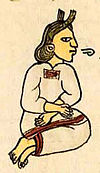Wiki Languages: Nahuatl (Nāhuatl)
| Language: Nahuatl (Nahuatl) | Local name: Nāhuatl |
| Language code: nah | Display language: Simple English (simple)|
| Speak area: Mexico | Classification: Amerindian |
| Country: Mexico | Second language: |
| Usage: extinct | Wiki language for Nahuatl |
Dictionary for Nahuatl (Nāhuatl) in Simple English
| English | Nahuatl |
| Nāhuatl | Simple English |
| Nahuatl | |
|---|---|
| Aztec | |
| Nāhuatl, Nāhuatlahtōlli, Mēxihcatlahtōlli, Mācēhuallahtōlli, Mēxihcacopa | |
 Nahua woman from the Florentine Codex. The speech scroll indicates that she is speaking. | |
| Native to | Mexico |
| Region | State of Mexico, Puebla, San Luis Potosi, Veracruz, Hidalgo, Guerrero, Morelos, Tlaxcala, Oaxaca, Michoacán, Chihuahua, Durango, and immigrants in United States, El Salvador, Guatemala, and Canada |
| Ethnicity | Nahua peoples |
Native speakers | 1,740,000 (2010) |
Language family | Uto-Aztecan
|
Early form | Proto-Nahuan |
| Dialects |
|
| Official status | |
Official language in | Mexico (through the General Law of Linguistic Rights of Indigenous Peoples)[1] |
| Regulated by | Instituto Nacional de Lenguas Indígenas[2] |
| Language codes | |
| ISO 639-2 | |
| ISO 639-3 | nciClassical NahuatlFor modern varieties, see Nahuan languages |
| Glottolog | azte1234 Aztec |
The Nahuatl language is a language spoken by 1.5 million people, mostly in Mexico.[3]
History
Nahuatl has existed since the 7th centuryCE.[4]
The first people to speak Nahuatl were indigenous peoples in central Mexico.[4] The Aztecs[3] and the Toltecs spoke an early form of Nahuatl.
The people of Teotihuacan may have spoken Nahuatl.[source?]
Nahuatl has changed since the end of the Aztec Empire. Over time, many different dialects of Nahuatl have developed. Today, people who speak different Nahuatl dialects do not always understand each other.
The words "Mexico," "Guatemala," and "Nicaragua" all come from Nahuatl.
Use today
Today, most people who speak Nahuatl live in central Mexico. but A few live in other parts of Mexico or in the United States.[3]
Nahuatl is one of the official languages of Mexico.[5] However, most people who speak Nahuatl now also speak Spanish.[3]
Many phrases that are unique to Mexican Spanish come from Nahuatl, according to John Lipski. The unique phrases are called "Mexicanisms." An example is ándale, which often means "let's go." Another example is the word Bueno? and is used by many Spanish-speakers when they answer the telephone.[6]
Nahuatl words in English
Some English words from Nahuatl origin are:[7][a]
- avocado
- axolotl
- cacao and cocoa
- chili
- chocolate
- coyote
- ocelot
- peyote
- sapote
- tequila
- tomato
Related pages
- Miguel León-Portilla
Notes
- ↑See also the English Wiktionary, which lists the origins of each of these words.
References
- ↑"General Law of Linguistic Rights of Indigenous Peoples"(PDF) (in Spanish). Archived from the original(PDF) on 11 June 2008.
- ↑"Instituto Nacional de Lenguas Indígenas homepage".
- ↑ 3.03.13.23.3Ager, Simon (2016). "Nahuatl (nāhuatl/nawatlahtolli)". Omniglot. Retrieved 23 February 2016.
- ↑ 4.04.1Suárez, Jorge A. (1983). The Mesoamerian Indian Languages. Cambridge Language Surveys. Cambridge and New York: Cambridge University Press. p. 149. ISBN 978-0-521-22834-3. OCLC 8034800.
- ↑IRIN, [Iniciativa para la Recuperación del Idioma Náhuat] (2004). "IRIN-International homepage". The Nawat Language Recovery Initiative. IRIN. Archived from the original on 20 May 2010. Retrieved 31 March 2008.
- ↑Lipski, John M. (2008). Varieties of Spanish in the United States. Georgetown University Press. pp. 88–89. ISBN 978-1-58901-651-4.
- ↑"Nahuatl Borrowings in Mexican Spanish Vocabulary". Nahuatl Culture. The Azteca Web Page. Retrieved May 27, 2016.
